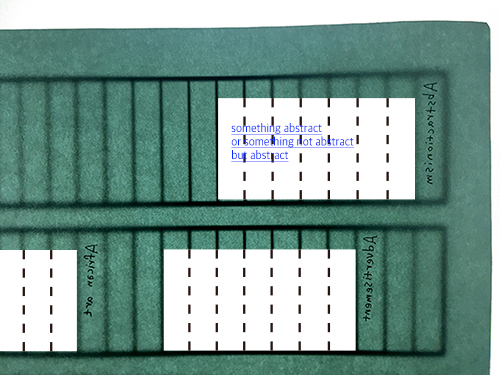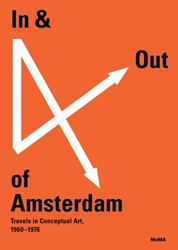When I walk through bookshelves comparing labels and the code I found in computer system, I feel that it is too right to do so. It is like a treasure hunt with a map showing exactly where the treasure is. The code efficiently directs me to the book I need but in a completely closed way. There can not be everything in a book itself. The thing I really want to get from books is more often in somewhere between books than in a single page. So the whole point is matching a book with a good pair, or a good group, or a good pile of books. This is a collective activity, which is not necessarily precise but friendly.
_____
1) Every spine of books you can see in front of the shelf is under a certain theme. They are like a quick index you can highlight. They follow the an alphabetical order, so you should go to the first shelf if you are looking for ‘Abstractionism’.

*The ‘theme books’ do not have to be really representative to be there, as long as they can stand autonomously with a clear keyword in their title and not duplicate the other theme.
2) If you feel like diving into the subject and seeing more things about it, you should go the other way around the shelf. Other books which are considered to be part of same category would be placed next to it in the opposite way. Just as you click the blue hyperlink in Wikipedia for extra information.
Photo references, books which are written by the same author or in the same series could be obviously related. But there also could be hidden connections which you would never understand the relevance of if you have not read them. Unexpected encounters from this l o o s e c o n n e c t i o n could offer a key to the totally different world, or an advanced step in a research, or maybe a clue in a maze that made you interested but confused. It opens up and widens the space between each little subjects and makes a playground to think and read.
3)Every reader can be a participant of the organization, so it is always welcome to replace or move books. There are no definite criteria to locate them-it is not random but super subjective. If you feel like that is not a right place for it or there is a better spouse for it, go for it. Maybe you could have a hard time to find the same book next time if someone disagreed with your choice and moved it, but that also enables you to track another adventure that the same book went through.
All the choices reflect personal moments and thoughts that people have really experienced and are willing to share them. The subjective reaction on books can find and activate the potential connection between them. With this, the identity of a book gets defined over and over again by its surrounding which continuously changes. Where is it? What is on the left side of it? What is on the right side of it? Where was it? Where is it going to be? This is a collective activity with unlimited possibilities, which is not necessarily precise but friendly.

